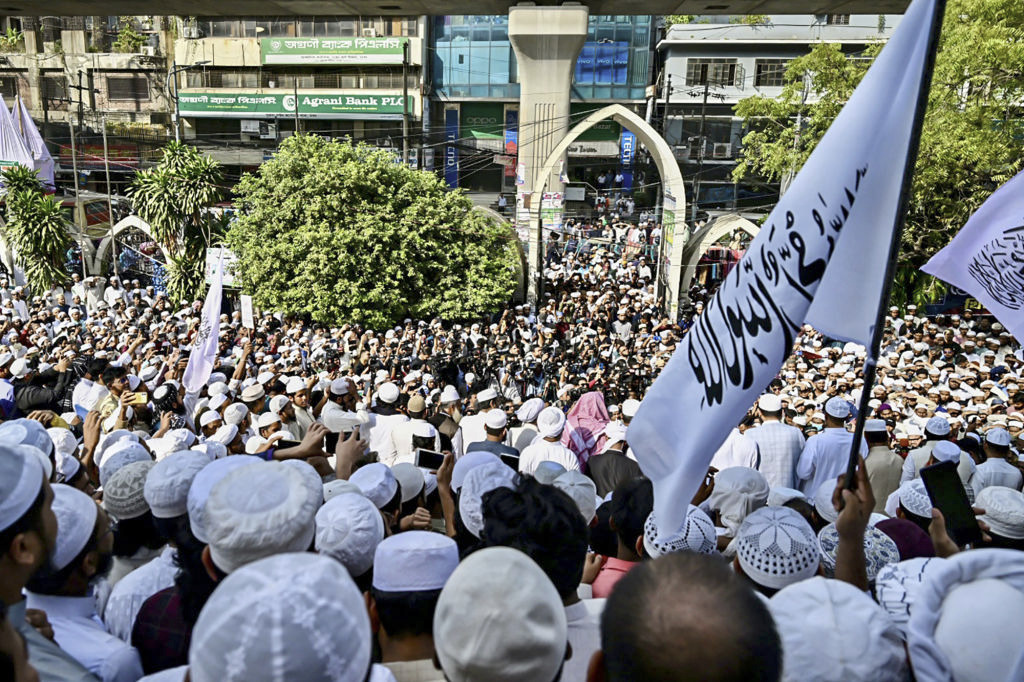
The rise of Islamist extremism in South Asia is entering a new and troubling phase. What began as a political movement cloaked in piety has increasingly transformed into a campaign of cultural and religious erasure. In Bangladesh, the latest target of jihadist wrath is the International Society for Krishna Consciousness (ISKCON), a global Hindu organization. Islamists now brand it an "extremist Hindutva group", call for banning it, commit arson against its temples, and violence against its followers. Their real goal, however, is far darker than banning a Hindu organization: it is to purge majority-Muslim Bangladesh of its remaining Hindu population and to reshape the country into a theocratic state.
Since last year's jihadist-backed coup in Bangladesh, attacks on ISKCON centers and Hindu temples in the country have sharply escalated. Hardline groups such as Hefazat-e-Islam (HeI) and Intifada Bangladesh have taken the lead in this campaign, with vocal support from elements within the country's government. In a disturbing development, the government's response to a court petition demanding a ban on ISKCON described the movement as a "religious fundamentalist organization". This rhetoric, once confined to the fringe, now finds a place in official discourse - a dangerous sign of how far Islamist influence has penetrated the state.
The case of Chinmoy Krishna Das, a former ISKCON member imprisoned for advocating better treatment of religious minorities, underscores the climate of intimidation. Radical mobs have repeatedly targeted ISKCON's temples in Bangladesh, vandalizing idols and torching prayer halls. Each attack serves the same purpose -- to terrorize religious minorities and silence voices that preach coexistence.
Recently, security agencies uncovered a chilling plot that could have ignited nationwide violence. Islamists fabricated a story that Mawlana Muhibullah Miyaji, a 60-year-old Muslim cleric from Tongi, had been abducted and tortured by ISKCON members. The narrative spread rapidly on social media, prompting calls for jihad against Hindus. Only a swift police investigation - aided by surveillance videos and forensic evidence - exposed the story as a complete fabrication.
Authorities believe the motive behind this staged abduction was to incite mob attacks on Hindu communities and ISKCON centers, plunging the country into chaos while distracting attention from the rapid radicalization of Bangladesh's Islamist ecosystem.
To the outside world, ISKCON hardly appears as a threat. Founded in New York City in 1966 by A.C. Bhaktivedanta Swami Prabhupada, the movement has grown into a global spiritual and humanitarian network. With over 500 temples, rural communities, and vegetarian centers worldwide, ISKCON promotes vegetarianism, devotional service, and universal brotherhood. Yet in the eyes of Islamist ideologues, peaceful outreach represents a challenge -- the assertion of a pluralistic worldview that contradicts their absolutist doctrine.
What makes this current wave of anti-Hindu agitation particularly alarming is its transnational dimension. Intelligence officials in Dhaka have identified growing coordination between Bangladeshi and Pakistani Salafist groups, some with direct ideological or logistical ties to organizations once linked to Al Qaeda and ISIS. The return of radical Islamist preacher Zakir Naik into Bangladesh -- made possible by the Yunus regime's decision to lift the ban on his Peace TV -- is viewed as a signal of state appeasement. Naik's record is well known: he has justified suicide bombings, glorified Osama bin Laden, and inspired the murderers behind the 2016 ISIS-style attack on Dhaka's Holey Artisan Bakery.
Even more disturbing is the arrival of Ibtisam Elahi Zaheer, a senior figure in Pakistan's Markazi Jamiat Ahl-e-Hadis and close associate of Hafiz Saeed, the mastermind of the 2008 terror attacks in Mumbai, India. Zaheer's speeches -- urging Muslims to "kill apostates" and denouncing Jews and Christians as "enemies of Islam" -- have drawn scrutiny from UK authorities for inciting violence. His presence in Bangladesh today raises urgent questions about who facilitated his entry and what networks stand behind him.
The growing coordination of Islamist movements across national borders, coupled with a permissive government, threatens not only Bangladesh's fragile communal harmony but also regional stability. The persecution of ISKCON is not merely an attack on a Hindu organization -- it is part of a larger strategy to dismantle Bangladesh's secularism and to replace tolerance with totalitarian theology.
If left unchecked, this campaign could transform Bangladesh into yet another bastion of jihadist ideology in South Asia.
Salah Uddin Shoaib Choudhury is an award-winning journalist, writer, and Editor of the newspaper Blitz. He specializes in counterterrorism and regional geopolitics.


